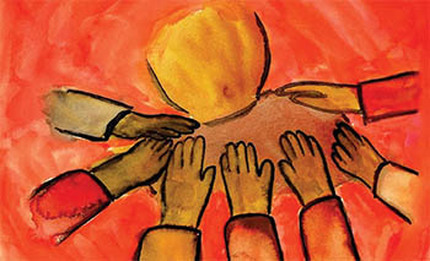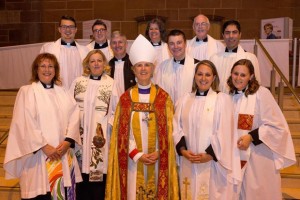“’I’m really grateful for the time I had [in seminary], but I still had this amazing job in ministry that I loved,” she said. “For me to go to seminary made absolutely no sense. Why would I stop doing what they were training me to do?’”
The Presbyterian Outlook reports that a Master of Divinity (M.Div.) degree, long considered the “gold standard” for those seeking ordination in many mainline denominations, may no longer be the most practical thing in the eyes of many students:
“A new projection from the Association of Theological Schools, the main accrediting body for seminaries in the U.S. and Canada, finds that the number of seminary students enrolled in various Master of Arts degrees will likely exceed the number of Master of Divinity students by 2021.
“There were 28,400 students enrolled in the Master of Divinity degree last year, a gradual decline from a high of 35,000 in 2006. By comparison, there were 23,300 students enrolled in seminary Master of Arts programs last year, up from 20,800 in 2006.
“… One [reason for decline] is the growth of seminaries affiliated with evangelical and Pentecostal denominations. These religious groups don’t typically require the Master of Divinity for men and women who want to be ordained.
“Over the past 50 years, the share of Americans who identify with mainline Protestants, on the other hand, has been shrinking significantly as younger millennials leave the church and the ranks of the unaffiliated grows.
“Some seminaries have responded by trimming the Master of Divinity credit hours from 90 to as low as 72 to be more competitive with the shorter M.A. degrees, while still keeping it a three-year degree.”
The article goes on to note that even the reduction in required hours is not doing much to attract new students, and that many are substituting practical experience for more traditional degree requirements:
“Angie Arendt, a UCC minister in Almonte, Ontario, started out as a lay minister in a small church in Gilman, Iowa. She later took a job as a youth minister and small groups minister at a much larger UCC church in Des Moines, Iowa.
“Though she took classes part-time at United Theological Seminary near Minneapolis, she never graduated but was ordained a minister.
“’I’m really grateful for the time I had there, but I still had this amazing job in ministry that I loved,” she said. “For me to go to seminary made absolutely no sense. Why would I stop doing what they were training me to do?’”
The canons governing the formation of clergy in the Episcopal Church do not require candidates for ordination to complete an M.Div. or equivalent, though they must demonstrate competency in six areas, including Holy Scriptures, church history, theology, Christian Ethics and Moral Theology, worship, and “The Practice of Ministry in contemporary society” (see Canons III.8.5.f and III.8.5.g, on page 92 of the current Constitution and Canons). In the most recent report by Church Pension Group on the state of Episcopal seminaries and their graduates, the writers note that similar trends also apply to TEC. The report is lengthy and does take some time to digest. Among other things, it hopefully notes that, “At the same time, the greater “openness” of some dioceses to non-Episcopal seminaries… tends to suggest that diocesan-level initiatives to promote Episcopal seminary attendance may impact this trend should the Church wish to slow or reverse it.”
The topic of theological education has been under discussion for quite some time. Despite the demographic shifts and apparent downsizing which TEC is experiencing, the essential questions remain the same. How do we ensure that seminarians must meet the same standards for “demonstrating competency” no matter where they choose to attend school? How do we keep newly ordained clergy out from under heavy debt loads which hinder their ability to accept calls to under-resourced parishes? And, how do we fully honor the gifts of those who are formed in programs which are either based in their local dioceses, or through other, “non-traditional” means?


